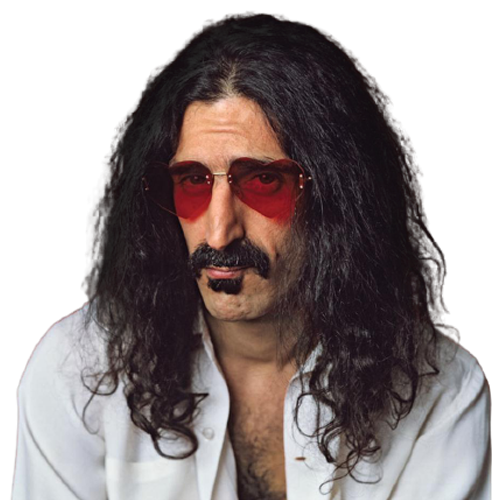All Releases List  view
view
 2018 - The Roxy Performances
2018 - The Roxy Performances
 2016 - ZAPPAtite (Frank Zappa's Tastiest Tracks)
2016 - ZAPPAtite (Frank Zappa's Tastiest Tracks)
 2016 - Meat Light
2016 - Meat Light
 1998 - Son of Cheep Thrills
1998 - Son of Cheep Thrills
 1997 - Have I Offended Someone?
1997 - Have I Offended Someone?
 1995 - Strictly Commercial: The Best of Frank Zappa
1995 - Strictly Commercial: The Best of Frank Zappa
 1992 - You Can't Do That on Stage Anymore, Vol. 6
1992 - You Can't Do That on Stage Anymore, Vol. 6
 1992 - You Can't Do That On Stage Anymore, Vol. 5
1992 - You Can't Do That On Stage Anymore, Vol. 5
 1991 - You Can't Do That On Stage Anymore, Vol. 4
1991 - You Can't Do That On Stage Anymore, Vol. 4
 1991 - Anyway the Wind Blows
1991 - Anyway the Wind Blows
 1991 - Make a Jazz Noise Here
1991 - Make a Jazz Noise Here
 1991 - The Best Band You Never Heard in Your Life
1991 - The Best Band You Never Heard in Your Life
 1989 - You Can't Do That on Stage Anymore, Volume 3
1989 - You Can't Do That on Stage Anymore, Volume 3
 1988 - You Can't Do That On Stage Anymore, Vol. 1
1988 - You Can't Do That On Stage Anymore, Vol. 1
 1988 - Guitar
1988 - Guitar
 1988 - Broadway the Hard Way
1988 - Broadway the Hard Way
 1988 - You Can't Do That on Stage Anymore, Vol. 2
1988 - You Can't Do That on Stage Anymore, Vol. 2
 1987 - Joe's Garage: Acts I, II & III
1987 - Joe's Garage: Acts I, II & III
 1987 - Joe's Garage: Acts I, II & III
1987 - Joe's Garage: Acts I, II & III
 1986 - The London Symphony Orchestra
1986 - The London Symphony Orchestra
 1986 - Jazz From Hell
1986 - Jazz From Hell
 1986 - Apostrophe (') / Over“Nite Sensation
1986 - Apostrophe (') / Over“Nite Sensation
 1986 - Does Humor Belong in Music?
1986 - Does Humor Belong in Music?
 1985 - Frank Zappa Meets the Mothers of Prevention
1985 - Frank Zappa Meets the Mothers of Prevention
 1985 - We're Only in It for the Money / Lumpy Gravy
1985 - We're Only in It for the Money / Lumpy Gravy
 1984 - Francesco Zappa
1984 - Francesco Zappa
 1984 - Thing‐Fish
1984 - Thing‐Fish
 1984 - Boulez Conducts Zappa: The Perfect Stranger
1984 - Boulez Conducts Zappa: The Perfect Stranger
 1984 - Them or Us
1984 - Them or Us
 1983 - The Man From Utopia
1983 - The Man From Utopia
 1983 - London Symphony Orchestra, Volume 1
1983 - London Symphony Orchestra, Volume 1
 1982 - Shut Up 'n Play Yer Guitar
1982 - Shut Up 'n Play Yer Guitar
 1982 - Ship Arriving Too Late to Save a Drowning Witch
1982 - Ship Arriving Too Late to Save a Drowning Witch
 1982 - Baby Snakes
1982 - Baby Snakes
 1981 - Shut Up 'n Play Yer Guitar Some More
1981 - Shut Up 'n Play Yer Guitar Some More
 1981 - Shut Up 'n Play Yer Guitar
1981 - Shut Up 'n Play Yer Guitar
 1981 - Return of the Son of Shut Up 'n Play Yer Guitar
1981 - Return of the Son of Shut Up 'n Play Yer Guitar
 1981 - You Are What You Is
1981 - You Are What You Is
 1979 - Sheik Yerbouti
1979 - Sheik Yerbouti
 1979 - Joe's Garage: Act I
1979 - Joe's Garage: Act I
 1979 - Orchestral Favorites
1979 - Orchestral Favorites
 1979 - Sleep Dirt
1979 - Sleep Dirt
 1979 - Joe's Garage: Acts II & III
1979 - Joe's Garage: Acts II & III
 1978 - Studio Tan
1978 - Studio Tan
 1977 - Zappa in New York
1977 - Zappa in New York
 1976 - Zoot Allures
1976 - Zoot Allures
 1974 - Apostrophe (')
1974 - Apostrophe (')
 1972 - Waka/Jawaka
1972 - Waka/Jawaka
 1970 - Chunga's Revenge
1970 - Chunga's Revenge
 1969 - Hot Rats
1969 - Hot Rats
 1967 - Lumpy Gravy
1967 - Lumpy Gravy
 1967 - Lumpy Gravy 67
1967 - Lumpy Gravy 67
Members
 1 Male
1 Male
Origin
 Baltimore, Maryland, USA
Baltimore, Maryland, USA
Genre
 Experimental
Experimental
Style
 Rock/Pop
Rock/Pop
Mood
 High
High
Born
Origin
Genre
Style
Mood
Born
5 users
5 users
4 users
3 users
3 users
Artist Biography
Available in:
Frank Vincent Zappa (born December 21, 1940 in Baltimore, Maryland, United States – December 4, 1993 in Los Angeles, California, United States) was an American composer, guitarist, singer, bandleader and producer. He was one of the most prolific musicians of his time, releasing over fifty albums of original material spanning over a thirty-five year career.
Born on 21st December 1940 in Baltimore, Maryland, Zappa’s earliest influences were 1950s pop and rock (such as doo-wop and rhythm and blues), and 20th-century classical composers including Igor Stravinsky and Edgard Varèse. His output was divided between adventurous instrumental compositions and succinct, catchy rock songs with ribald, satirical, or comically absurd lyrics. On stage he demanded virtuosity and spontaneity from his musicians, and employed many performers who would later go on to achieve fame in their own rights. He directed and released a number of films featuring himself, his musicians and entourage, including 200 Motels and Baby Snakes.
His career started in 1955. His earliest recordings date from the mid-1960s, and include collaborations with his school friend Captain Beefheart. In 1965 he joined a bar-band called The Soul Giants, quickly dominating its musical direction and rechristening it The Mothers. Their first release (as The Mothers of Invention; the name alteration requested by their record company) was the 1966 double album Freak Out!. The line-up of the Mothers gradually expanded to accommodate Zappa’s increasingly ambitious and avant-garde music, but by 1969 he decided to work outside the band structure, focusing on his solo career, and effectively disbanding the Mothers in 1971.
The beginnings of his solo career in the late sixties and early seventies was characterised by a strong free jazz influence, with albums containing little, if any, lyrical content, such as Hot Rats, Waka/Jawaka and The Grand Wazoo. Towards the mid-seventies his albums became more rock-orientated, with a combination of jazz fusion instrumentation and rock song structures. This more accessible sound bore reasonable mainstream appeal, especially with the release of the well-advertised albums Over-Nite Sensation and Apostrophe (‘) (which both went Gold), but Zappa’s unpredictably eclectic output never led to solid mainstream recognition. He receieved uniformly lukewarm reviews from popular music publications such as Rolling Stone throughout his career. In his late seventies’ output, the gulf between his humorous songs and more lengthy, complex instrumental music widened, and albums, such as Zappa In New York, Joe’s Garage: Acts I, II & III, and Sleep Dirt displayed, by track, both sides firmly segregated.
Zappa saw a second run of success in the early eighties with the release of many albums with predominantly comedic rock songs, but later continued to experiment with virtually every style of music through the eighties, and was productive as ever until his death. His output in this later-career period included two albums of strikingly original classical music with the London Symphony Orchestra, an electronic take on 18th-century chamber music (written by the obscure Italian composer ‘Francesco Zappa’, no relation), an album of synclavier compositions (misleadingly titled Jazz From Hell which garnered a Grammy award), a double-CD release of electric guitar instrumental music (the laconically titled Guitar) and a plenitude of official live releases, revisiting fan-favourites as well as showcasing Zappa’s talent for reinventing the music of others; his version of Stairway To Heaven becoming a word-of-mouth favourite.
Zappa produced almost all of his own albums, spending many hours in the studio recording and manipulating tracks, and was always at the forefront of emerging technologies; from tape editing, collage, multitrack and overdubbing in the sixties to digital recording, electronic instruments and sampling in the eighties. Conversely, Zappa was also a obsessive self-archivist, recording virtually every one of his live performances, and often using live recordings of new material without needing to enter the studio. The archive of tapes at his family home in Los Angeles continues to be a source of posthumous releases for the Zappa Family Trust. He was also noted as a spotter of talent and his shifting line-up of musicians included Lowell George, Jean-Luc Ponty, Terry Bozzio, Chad Wackerman, George Duke, Mike Keneally, Adrian Belew and Steve Vai, as well as giving Alice Cooper his first break in music and working again with his old collaborator Captain Beefheart when his career was in decline.
In the late 1980s he became active in politics, campaigning against the PMRC’s music censorship scheme and acting as culture and trade representative for Czechoslovakia in 1989; and considered running as an independent candidate for president of the US.
His death in Los Angeles, California, on 4th December 1993 came three years after he was diagnosed with prostate cancer.
Wide Thumb

Clearart

Fanart




Banner

User Comments
 No comments yet..
No comments yet..

 100%
100%